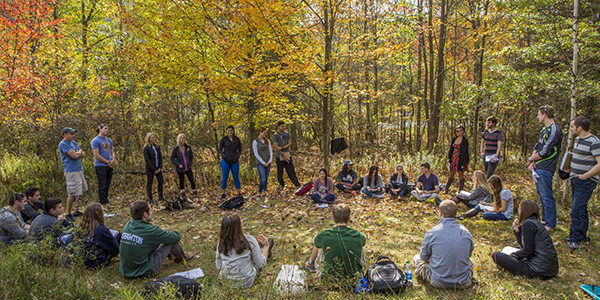Binghamton University a top performer in 2020 Sustainable Campus Index
Takes top spot in sustainability research for second consecutive year

For the second year in a row, Binghamton University has been recognized as a top performer in the 2020 Sustainable Campus Index, achieving the top spot in the Research subcategory among doctoral institutions. A publication from the Association for the Advancement of Sustainability in Higher Education (AASHE), the Sustainable Campus Index recognizes top-performing sustainable colleges and universities overall and in 17 impact areas, as measured by the Sustainability Tracking, Assessment & Rating System (STARS).
“This recognition as a top performer in sustainability research is strong validation of the work being done across campus and, in particular, by members and affiliates of our Sustainable Communities Transdisciplinary Area of Excellence (TAE),” said Donald Nieman, executive vice president for academic affairs and provost. “The Sustainable Communities TAE has developed into an active, deep network of collaborators across disciplines ranging from environmental studies to health and wellness, and from systems science to economics. It is an exemplar of what we envisioned when we developed the TAEs to address critical issues of the day.”
“Productive research on sustainability requires convergent integration of a broad array of researchers including computer scientists, anthropologists, health science researchers, geographers, biologists, political scientists, economists, public administration researchers, artists, historians, sociologists, among others,” said Carl Lipo, Harpur College associate dean for research and programs and chair of the Sustainable Communities TAE. “With this latest recognition by AASHE as a top performer in sustainability research, Binghamton University faculty, students and staff have clearly demonstrated our common vision for collaborative, community-engaged and deeply impactful programs of education and scholarship.”
“Binghamton University is being recognized for its incredible work in creating a more sustainable world,” AASHE Executive Director Meghan Fay Zahniser said. “Through the University’s leadership and action by change agents, I’m encouraged and hopeful that a just and equitable society will soon be realized.”
Binghamton achieved top performer status with a 100% score in the Research subcategory in STARS, tying with four other schools: Florida State University; University of California, Irvine; UC Merced and UC San Diego. Of the 601 researchers across 42 departments that include at least one researcher on campus, 155 researchers and 35 departments are engaged in some aspect of sustainability research.
The breadth and depth of research in sustainability is fostered in a number of ways at Binghamton. Barrett Brenton is the faculty engagement associate with the Center for Civic Engagement (CCE), working to further faculty and student participation in community-based teaching, learning and scholarship activities.
“The University’s hallmark commitment to sustainability continues to be strengthened by its relationships with local and regional community partners,” Brenton said. ”We at the CCE have seen this best exemplified through the growth of interdisciplinary, community-based research and scholarship resulting in positive sustainable solutions for our area. This has included a wide range of work related to sustainable food, water, health and energy systems. We are excited about a trend among our faculty, students and staff in creating impactful, mutually-engaged and reciprocal relationships in support of sustainable futures with and for our community,”
The sustainability research that is taking place at Binghamton provides exceptional opportunities for undergraduate education according to Valerie Imbruce, who directs the University’s Undergraduate Research Center. “We have first-year programs like the First-year Research Immersion program and the Source Project, as well as summer research and upper-level courses in which students investigate invasive species and water pollution, deindustrialization and education, affordable housing and food security.
“Our students have written children’s books about amphibians and bacteria, published in academic journals, presented research at national conferences, and won awards from the National Science Foundation to continue research in graduate school and abroad through the Fulbright U.S. Student Program,” she added. “We focus on fostering social progress by bringing students into a culture of curiosity through the development of their ability to ask questions and seek answers to community-based problems.”
Binghamton’s STARS report is publicly available on the STARS website.
